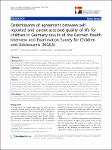Determinants of agreement between self-reported and parent-assessed quality of life for children in Germany - Results of the German Health Interview and Examination Survey for Children and Adolescents (KiGGS)
Ellert, Ute
Ravens-Sieberer, Ulrike
Erhart, Michael
Kurth, Bärbel-Maria
Background: The aim of this study is to quantify the level of agreement between self-reporting and proxy-assessment of children's health-related quality of life using KINDL-R in a large population based study in Germany and to identify factors which are associated with agreement. Methods: The German Health Interview and Examination Survey for Children and Adolescents included the KINDL-R questionnaire on health-related quality of life. 6388 children and adolescents filled in the questionnaire while their parents answered the proxy version. Means and standard deviation for the self- and proxy ratings, and also the Pearson und Intra-Class correlation coefficients for the absolute agreement were calculated. The relationship between other variables and parent-child agreement were determined by means of logistic regression. Results: In the 'Physical', 'Self-esteem' and 'School' dimension and for the 'Total' score, the parents significantly overestimated the quality of life of their child. In contrast, the quality of life of the children in the dimensions 'Psychological well-being' and 'Family' were considerably underestimated by the parents. The proportion of parent-child ratings in agreement (difference < 0.5 standard deviations) ranges from 34.9% for the 'Self-esteem' scale to 51.9% in the 'Psychological' scale. The most important factor explaining parents rating was the level of the child's self-assessment followed by the parent's assessment of the subjective health, or reported emotional abnormalities. Conclusions: Our study shows that parental reports cannot adequately replace self-assessment for 11-17 year olds. In view of the different underlying perspectives, the parental assessments should where possible only be regarded as providing supplementary information.
No license information

